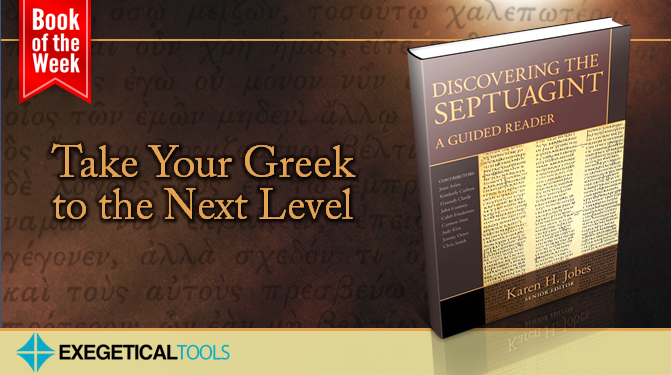
The best way to improve your Greek is to read lots of it. We all enjoy reading the New Testament in Greek, but Koine Greek is much broader than the NT. The two corpora we should turn to first to continue expanding our Greek horizons are the Apostolic Fathers and the Septuagint. The Greek of the latter is probably easier (overall) and is therefore a great place to start.
Karen Jobes, Septuagint expert, thought so as well. That’s why she designed an Advanced Greek Exegesis course around Septuagint texts. She has taught it at Wheaton for years and decided to convert what they did in class into a textbook. Thus was born Discovering the Septuagint: A Guided Reader.
This text is designed to facilitate your reading of Septuagint in large chunks. When I opened the pages, I was pleased to find morphological and syntactical helps for each passage so I could read a verse in Greek and then use any helps I needed (especially vocabulary) to work my way through the text.
Also useful is the diversity of texts. Jobes included readings from Genesis, Exodus, Deuteronomy, Ruth, LXX Greek additions to Esther, the Psalter, Hosea, Jonah, Malachi, and Isaiah. The end of each section of reading (e.g., after Genesis 2) includes all the NT passages that cite from that OT section. Each new section includes a brief introduction to the critical matters of the Septuagint translation of the book at hand.
Take note, however, that this book is not intended to equip you for Septuagintal studies. This is a guide to reading the Greek of the Septuagint, not to comparing it to the MT and discussing various theories on LXX translation philosophy. For example, the MT of Exod 15:3 says Yahweh is a “man of war,” while the LXX says he is “one who shatters wars.” The LXX translator gives an opposite meaning to the text, but Jobes and the contributors do not comment on that fact, they simply provide parsing and syntax help with the clause as it reads in Greek. This is not a problem with the book, but one that readers should be aware of. The book is to help you improve your Greek, not to teach you Septuagint studies!
After reading through various sections, the book helped me make some interesting (and random) observations, which demonstrate how useful the book is:
- In Ruth 1:12, the translator mimics the Hebrew slavishly and awkwardly: זקנתי מהיות לאישׁ (“I am too old for a man”) is translated γεγήρακα τοῦ μὴ εἶναι ἀνδρί (“I have grown old so that [I] am not for a man”).
- The book of Esther has major additions in the LXX and has two texts, LXX Esther and the Alpha-text (AT). While the Hebrew story does not mention God once, he is mentioned 26 times in the Greek additions. (The latter fact I learned recently, but had I not, I would have learned it here!)
- Psalm 151 isn’t very hard Greek to read! I’ve actually never read it before in Greek, but it’s included here in the book so I read it quickly and enjoyed it.
- Whereas Jonah in the MT says “a Hebrew I am” (עברי אנכי [Jon. 1:9]), the LXX reads δοῦλος κυρίου ἐγώ εἰμι (“a slave of the Lord I am”). There are many possible inferences we can draw from this. First, the LXX translator simply innovated. Second, he misread MT עברי as עבד (“servant”) and added “of the Lord” for an implied יהוה. Third, the LXX reading is older (the authors notes 2 Kgs 14:25, where Jonah is called a “servant” of the Lord) and the MT has innovated or deviated. There are likely more options as well.
These examples show, first, that you will learn much by reading the LXX, especially when you have as sure a guide as Karen Jobes to help you through. They show, secondly, that getting into the Greek of the LXX is interesting enough to hold your attention and help you read lots of Greek!
This textbook is a useful tool that enables you to sit quietly and plow through mounds of unfamiliar Greek. Any tool that enables you to do so is worthy owning and using.
A useful tool that enables you to sit quietly and plow through mounds of unfamiliar Greek Share on XPreview or buy it here on Amazon.

